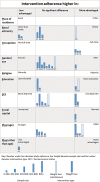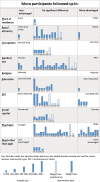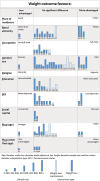A systematic review of inequalities in the uptake of, adherence to, and effectiveness of behavioral weight management interventions in adults
- PMID: 35243743
- PMCID: PMC9285567
- DOI: 10.1111/obr.13438
A systematic review of inequalities in the uptake of, adherence to, and effectiveness of behavioral weight management interventions in adults
Abstract
The extent to which behavioral weight management interventions affect health inequalities is uncertain, as is whether trials of these interventions directly consider inequalities. We conducted a systematic review, synthesizing evidence on how different aspects of inequality impact uptake, adherence, and effectiveness in trials of behavioral weight management interventions. We included (cluster-) randomized controlled trials of primary care-applicable behavioral weight management interventions in adults with overweight or obesity published prior to March 2020. Data about trial uptake, intervention adherence, attrition, and weight change by PROGRESS-Plus criteria (place of residence, race/ethnicity, occupation, gender, religion, education, socioeconomic status, social capital, plus other discriminating factors) were extracted. Data were synthesized narratively and summarized in harvest plots. We identified 91 behavioral weight loss interventions and 12 behavioral weight loss maintenance interventions. Fifty-six of the 103 trials considered inequalities in relation to at least one of intervention or trial uptake (n = 15), intervention adherence (n = 15), trial attrition (n = 32), or weight outcome (n = 34). Most trials found no inequalities gradient. If a gradient was observed for trial uptake, intervention adherence, and trial attrition, those considered "more advantaged" did best. Alternative methods of data synthesis that enable data to be pooled and increase statistical power may enhance understanding of inequalities in behavioral weight management interventions.
Keywords: inequalities; interventions; obesity; weight management.
© 2022 The Authors. Obesity Reviews published by John Wiley & Sons Ltd on behalf of World Obesity Federation.
Conflict of interest statement
ALA is principal investigator on two publicly funded (NIHR, MRC) trials where the intervention is provided by WW (formerly Weight Watchers) at no cost. SJG is principal investigator on a publicly funded (NIHR) trial in which the intervention is provided by WW (formerly Weight Watchers) at no cost. MPK has undertaken consultancy for Slimming World, and led the obesity and weight management guidelines development for NICE from 2005 until 2014.
Figures







References
-
- Forouzanfar MH, Afshin A, Alexander LT, et al. Global, regional, and national comparative risk assessment of 79 behavioural, environmental and occupational, and metabolic risks or clusters of risks, 1990–2015: a systematic analysis for the Global Burden of Disease Study 2015. The Lancet. 2016;388(10053):1659‐1724. doi: 10.1016/s0140-6736(16)31679-8 - DOI - PMC - PubMed
-
- LeBlanc ES, Patnode CD, Webber EM, Redmond N, Rushkin M, O'Connor EA. Behavioral and pharmacotherapy weight loss interventions to prevent obesity‐related morbidity and mortality in adults: updated evidence report and systematic review for the US preventive services task force. JAMA. 2018;320(11):1172‐1191. doi: 10.1001/jama.2018.7777 - DOI - PubMed

